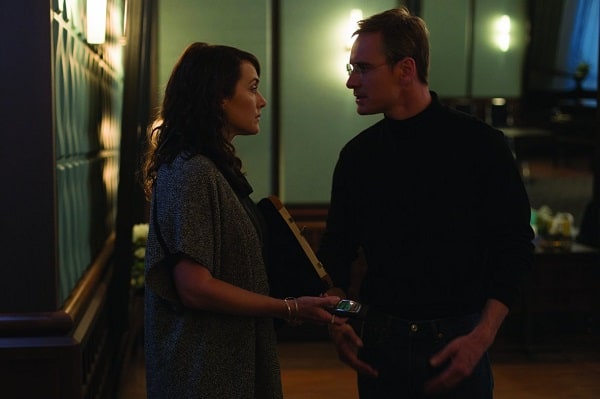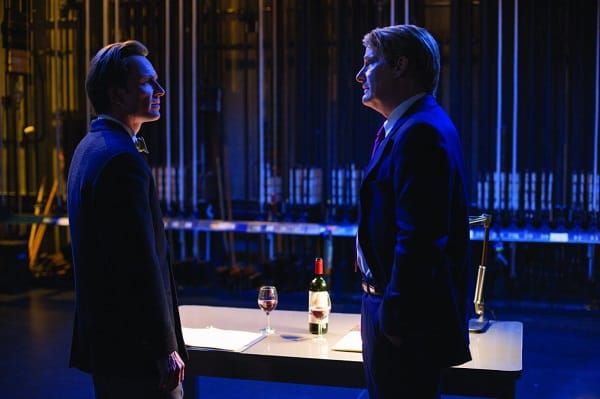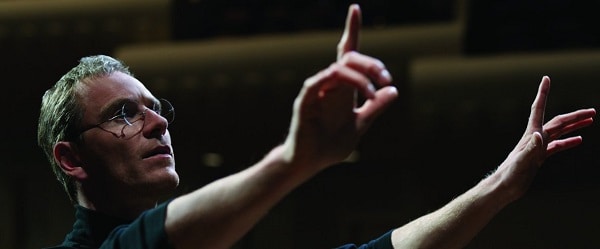
Written by Aaron Sorkin (adapted from the novel by Walter Isaacson)
Directed by Danny Boyle
USA, 2015
Perhaps the masterstroke of Steve Jobs is that it reveals everything about its elusive subject, and yet, in the end, he remains a complete enigma. Bolstered by the best script of 2015 and masterful performances from Michael Fassbender and Kate Winslet, director Danny Boyle’s propulsive character study is a fascinating glimpse at the evolution of a cult icon. Boyle and screenwriter Aaron Sorkin get a bit too theatrical at times, but this is the best film we’re likely to see about a complicated man who was equal parts narcissist, tyrant, and genius.
“I’m poorly made.”
This final self-realization from Steve Jobs (Fassbender) might also describe his early efforts as a techno-trailblazer. Brainstorming in a funky garage with equally-funky collaborator Steve Wozniak (Seth Rogen), Jobs envisions a computer system that is “Closed from end to end.” Like the Macintosh, his first foray into the world of personal computers in 1984, Jobs is hermetically sealed; closed from end to end. His second attempt at immortality, the NeXT Computer System, didn’t even have a functioning operating system at the time of its launch in 1988! By the time Jobs finally conquered the world with iMac in 1998, he was already a legend, largely of his own creation. His greatest gift as a businessman, and what Steve Jobs illustrates beautifully, was his ability to play the long game while his competitors (and colleagues) were trapped by conventional wisdom.
 You could teach a masterclass from Sorkin’s script, which wisely forgoes all attempts to condense such an unwieldy story into a satisfying 2-hour chunk. Instead, Sorkin focuses on the Macintosh, NeXT, and iMac product launches. More specifically, Jobs is visited by his own personal demons, personified in the forms of Wozniak, John Sculley (the CEO of Apple), Andy Hertzfeld (member of the original Macintosh team), and Jobs’ former girlfriend Chrisann (Katherine Waterston) and the daughter he refuses to acknowledge, Lisa. Each “ghost” visits Jobs just minutes prior to a chaotic launch, each time with increasing ferocity. It’s a device taken straight from the stage and it works completely, though Sorkin indulges a few too many of his trademark (and admittedly) brilliant speeches.
You could teach a masterclass from Sorkin’s script, which wisely forgoes all attempts to condense such an unwieldy story into a satisfying 2-hour chunk. Instead, Sorkin focuses on the Macintosh, NeXT, and iMac product launches. More specifically, Jobs is visited by his own personal demons, personified in the forms of Wozniak, John Sculley (the CEO of Apple), Andy Hertzfeld (member of the original Macintosh team), and Jobs’ former girlfriend Chrisann (Katherine Waterston) and the daughter he refuses to acknowledge, Lisa. Each “ghost” visits Jobs just minutes prior to a chaotic launch, each time with increasing ferocity. It’s a device taken straight from the stage and it works completely, though Sorkin indulges a few too many of his trademark (and admittedly) brilliant speeches.
Danny Boyle, too, is in fine form. His camera follows the serpentine Jobs as he prowls through backrooms and corridors with his hapless minions. It’s like being attached to the shark from Jaws, only not nearly as cordial. For a film comprised almost entirely of rapid-fire dialogue, Boyle still manages to assert his electric directorial style into the equation. He and Sorkin were made for each other, with their rhythms meshing into a palpable tension that never loosens its grip.
 And then there is the performance of Michael Fassbender.
And then there is the performance of Michael Fassbender.
Fassbender so completely inhabits the role that Steve Wozniak, after screening the film, commented that he felt as though he was “actually watching Steve Jobs.” His natural intensity serves him well here, as he alternates between eviscerating people with words and soul-squashing gazes. Regardless of how intriguing we find Steve Jobs, he would be an insufferable prig without the humor and humanity that Fassbender brings. In an instant, his raging countenance softens like Silly Putty; a silent acknowledgement that he’s gone too far. It’s a triumphant performance filled with nuance and simmering passion.

The rest of the cast is uniformly excellent. Rogen might seem an odd choice for an Apple 2 programming genius, but he perfectly matches the snarky intensity of a performer like Fassbender. Jeff Daniels does well as John Sculley; the boss who was part mentor and part tormentor for Jobs. It goes without saying that Daniels can hold his own with droll coolness, but he can also snarl and bite when things get nasty. Finally, Michael Stuhlbarg plays a nerd with substance in Andy Hertzfeld, capturing the combination of awe and insecurity that Jobs must have engendered from his collaborators.
 Most of the apparent flaws in Steve Jobs reside in the storyline surrounding his former girlfriend and daughter. While Sorkin is perfectly comfortable alongside powerbrokers and their sycophantic subordinates, he struggles to capture the understated tension between a father and his daughter. The speechifying also intensifies in the film’s final act, as Jobs’ associates make one last push to save his soul. These are the only moments when you feel the confines of what is, basically, a glorified stage play.
Most of the apparent flaws in Steve Jobs reside in the storyline surrounding his former girlfriend and daughter. While Sorkin is perfectly comfortable alongside powerbrokers and their sycophantic subordinates, he struggles to capture the understated tension between a father and his daughter. The speechifying also intensifies in the film’s final act, as Jobs’ associates make one last push to save his soul. These are the only moments when you feel the confines of what is, basically, a glorified stage play.
Still, Steve Jobs is what you want from showcase cinema. It’s got terrific writing, bold direction, and huge performances, all in the service of a fascinating story. As Jobs takes the stage to launch his coup de grâce on the tech-world, iMac, it’s clear that Boyle and Sorkin have documented the ascension of a modern-day cult. That’s the moment when Steve Jobs becomes less about the megalomania of one man and the obsession of millions of consumers. Jobs famously said that “People don’t know what they want until you show it to them.” His singular vision captivated the world and re-shaped it in his own image. That image might have been deeply flawed, but it was never less than enthralling.

